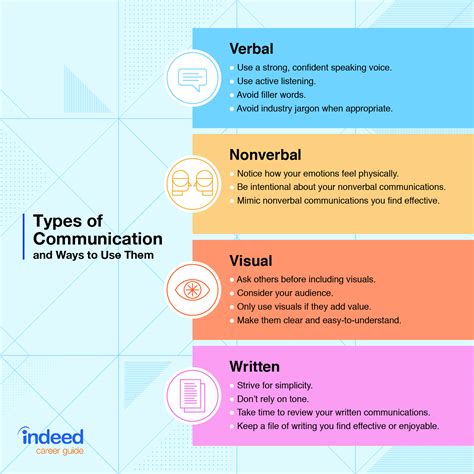Improving Communication: Exploring 4 Types & Tips

Effective communication is essential in all aspects of life, whether it’s in personal relationships, professional settings, or social interactions. It allows us to express ourselves, understand others, and build meaningful connections. However, communication is not a one-size-fits-all concept. There are various types of communication, each requiring different skills and techniques to master. In this article, we will explore four types of communication and provide tips on how to improve them.
1. Verbal Communication
Verbal communication is the most common form of communication, involving the use of spoken words to convey messages. It includes face-to-face conversations, phone calls, presentations, and public speaking. Here are some tips to enhance your verbal communication skills:
- Speak clearly and articulate your words.
- Use appropriate tone and volume.
- Pay attention to non-verbal cues, such as body language and facial expressions.
- Listen actively and respond appropriately.
- Ask questions for clarification or to show interest.
2. Non-Verbal Communication
Non-verbal communication refers to the use of gestures, body language, facial expressions, and other visual cues to convey meaning. It often complements verbal communication and can sometimes even be more powerful than words alone. Here are some tips to improve your non-verbal communication:
- Maintain eye contact to show attentiveness.
- Use open and relaxed body posture.
- Pay attention to your facial expressions.
- Use hand gestures to emphasize key points.
- Be mindful of personal space and respect boundaries.
3. Written Communication
Written communication involves the use of written words to convey messages. It includes emails, memos, reports, letters, and social media posts. Good written communication skills are crucial in conveying ideas accurately and professionally. Here are some tips to enhance your written communication:
- Organize your thoughts before writing.
- Use clear and concise language.
- Proofread for grammar and spelling errors.
- Structure your writing with paragraphs and headings.
- Use appropriate tone and style for the intended audience.
4. Listening Skills
Listening is a vital aspect of communication, often overlooked but essential for effective understanding. It involves not just hearing the words spoken but actively processing and comprehending the message being conveyed. Here are some tips to improve your listening skills:
- Give your full attention to the speaker.
- Avoid interrupting or finishing others’ sentences.
- Show empathy and understanding.
- Ask clarifying questions to ensure comprehension.
- Practice active listening techniques, such as paraphrasing and summarizing.
Conclusion
Communication is a multifaceted skill that can always be improved. By understanding and practicing the different types of communication, you can enhance your ability to connect with others, express yourself effectively, and build stronger relationships in all areas of your life.
Frequently Asked Questions
- Why is communication important?
- What are the different types of communication?
- How can I improve my communication skills?
- What are some common barriers to effective communication?
- How can I overcome communication barriers?
Communication is essential for expressing ourselves, understanding others, and building meaningful connections. It is the foundation of relationships and plays a crucial role in all aspects of life.
The four main types of communication are verbal, non-verbal, written, and listening skills. Each type requires different skills and techniques to master.
Improving communication skills involves practicing active listening, paying attention to non-verbal cues, using clear and concise language, and being mindful of the audience and context.
Common barriers to effective communication include distractions, lack of clarity, cultural differences, emotional barriers, and poor listening skills.
To overcome communication barriers, it is important to practice active listening, seek clarification when needed, be aware of non-verbal cues, and adapt your communication style to the situation.
